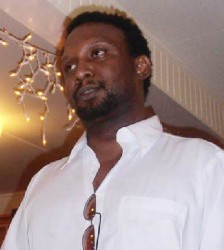With two Guyana Prize awards now under his belt, local writer Ruel Johnson is determined to do his best to transform his homeland into a hub for the arts.
“My medium-term vision is to produce literary work, and by literary I mean a gamut from poems to high-quality movie scripts that would eventually help establish a viable cultural industry framework in Guyana,” Johnson said in a recent interview with this publication.

Several years ago Johnson began his journey to prove that resident Guyanese writers could produce quality prize-winning work. So when at age 22, he captured the Guyana Prize award for Best First Fiction for Ariadne and Other Stories, he had already begun to fulfil his mission. When he was recently adjudged the winner of the 2013 Guyana Prize for Best Book of Fiction for the manuscript Collected Fiction, it represented another significant step for him in his journey. “My task [is] has been and my task years ago [was] to show that people writing from here can produce competitive, award winning work,” Johnson said. “I believe that writing focused here, with the core of the themes etc, can be world quality literature,” he added.
The 2013 Guyana Prize Awards were marked by a number of resident writers winning. The other winners for 2013 are Mosa Telford who won the prize for the Best Drama, Cassia Alphonso and Ian McDonald, who jointly shared the award for the Best Book of Poetry and Chaitram Singh who won the First Book of Fiction award. All, apart from Singh, are local residents and Johnson hailed this as both a historic and remarkable achievement.
This, he notes has come even in socio-political circumstances which are not fully supportive of the arts. The outspoken author is a frequent contributor to the letters to the editor columns of the Stabroek News and Kaieteur News where he has criticized aspects of the management of the Guyana Prize as well as the Caribbean Press.
One of his main criticisms regarding the Guyana Prize is the irregularity in which the biennial awards are held. He noted that after being held in 2006, the awards were not held again until 2011. Both 2006 and 2011 were election years, Johnson noted. He told Stabroek News that as a matter of principle he decided not to enter any work for the 2011 prize. According to him, he entered this year because at least the prize was adhering to its two-year cycle.
Another of Johnson’s grouses is that there has not been a culture of literary development associated with or complementary to the Guyana Prize. He said that while the occasional sessions are held these are more writing clinics than workshops. “A workshop has to produce something tangible,” he said. Johnson noted that while the complaint is often made that the Guyana Prize winners do not give back their expertise, his skills have not been fully utilised even though he has signalled his willingness to assist. He believes this is because of his outspokenness.
“I will criticize you from now to next year if you’re doing something wrong but that does not mean I am not willing to work with the powers that be, in order to bring development…,” Johnson stressed.
Johnson was also critical of what he perceived as the boycott of the recent awards by the Cabinet and the state-owned media. He noted that with the exception of President Donald Ramotar no single Cabinet member was present at the recent award ceremony when the prize winners were announced. He also pointed to the limited coverage offered by the state media on the premier literary event in the country.
While his frequent letters and constant criticisms on social media may not have endeared him to many, Johnson says he will not back down since he believes that there is value for standing up against wrongdoing.
Johnson’s immediate plans include finishing off his first play within the next six months and concluding two movie scripts. “I believe film is the next frontier,” Johnson said.
One of the scripts focuses on international terrorism but it is set in Guyana, while the other is science-fiction which examines the role of social media in contemporary political movements. He has been working on them for two years, he disclosed. He is also working on a triptych of novellas which he hopes to publish within the next year or two. This publication, he believes, will mark a significant evolution in his work.
He is considering producing a long poem. He also intends to pilot writing workshops in schools and plans on working on some text books through Janus Ideas and Janus Books, the publication arm of the company he has established.
But for Guyana to be the home of a viable cultural industry, Johnson notes that there must be relevant international property rights legislation. He said that the authorities need not implement blanket copyright measures but a nuanced copyright framework which will house local talent.
Johnson noted that the Georgetown Chamber of Commerce & Industry (GCCI) has put out a call for proposals on this issue. The creative arts, he believes, can be a huge income earner for Guyana and as such believes that the private sector is taking a step in the right direction by focusing on such matters.
Asked whether he was disciplined enough to accomplish all he has set out do so, Johnson noted that while his critics may paint him negatively, he has still managed to produce two prize winning books which should say a lot about his ability to deliver.




